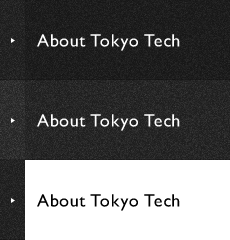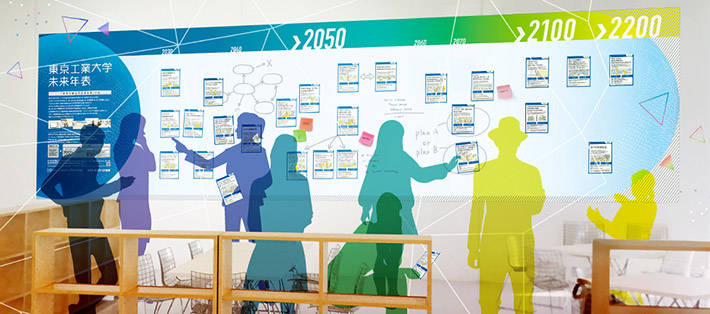
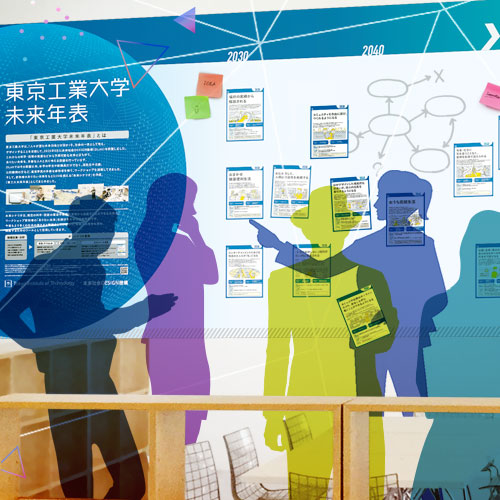
What kind of future do we really want? The need to discuss this fundamental question openly with the public played a key role in the establishment of the Laboratory for Design of Social Innovation in Global Networks, or DLab , in October 2018.
, in October 2018.
Since then, Tokyo Tech has led a series of workshops and events involving faculty, staff, students, business professionals, middle and high school students, and other citizens to design images of and paths towards a better future. The Tokyo Tech Future Chronology, a collection of future scenarios created through these workshops, was released on January 20, 2020.
Director Isao Satoh and three other DLab members — Professor and Associate Director Naoto Ohtake, Associate Professor Asa Ito, and Associate Professor Shinji Kawana — recently shared their thoughts on DLab's achievements, the creation of a desirable future, and the role of science and technology in this process.
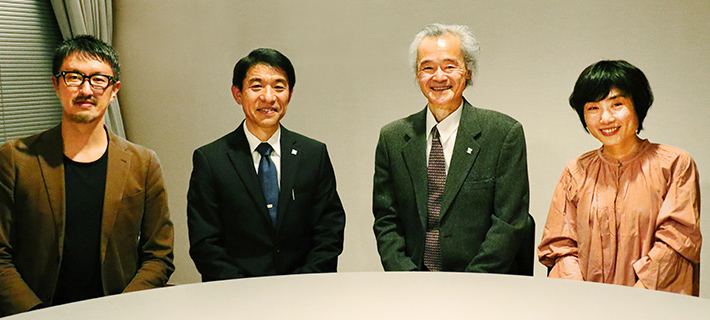
(from left) Assoc. Prof. Kawana, Prof. Ohtake, Provost and EVP Satoh, Assoc. Prof. Ito
DLab — What is it and why now?
SatohDLab is a platform where Tokyo Tech members can openly discuss the creation of a better future with members of the public. If we go right to the beginning, the seeds of DLab were sown during Tokyo Tech's application to become a designated national university in 2017. The core concept, however, remains simple. Science and technology researchers have always formulated images of societal issues and sought to create solutions to these issues. Through DLab, we hope to ensure that, while these researchers accumulate knowledge, they are also highly aware of what the public truly wants. DLab is set within the framework of Tokyo Tech, but it aims to contribute to the creation of a better future on a much larger scale.
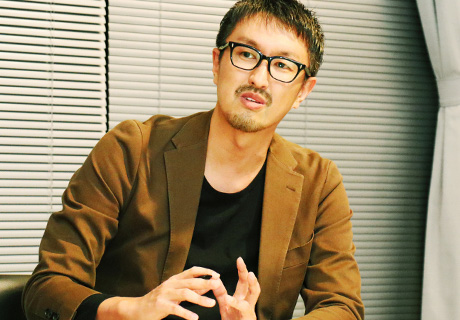
KawanaAs a political scientist, I view DLab as a fresh approach to potentially break stalemates in the social sciences and humanities. What if we were to address deadlocks caused by value conflicts and tensions from a completely different perspective? It is truly exciting to consider that science and technology may provide solutions which have been completely overlooked by social scientists.
ItoWe all have specializations, and DLab provides a great opportunity to step outside our comfort zones and examine the bigger picture. What kind of broad movement or vision links all of our activities? This question should be considered not only by Tokyo Tech researchers, but also by scientists and engineers in general. As a liberal arts scholar, I want to team up with these scientists and engineers so we can create a bigger vision for each other.
OhtakeAs members of both Tokyo Tech and DLab, we are asking ourselves how well we are connected to the public, and to what extent our work is creating a better tomorrow. People cannot see the future, and they are concerned, particularly in terms of scientific and technological developments. "Are we really ok?" they ask. "Can we really push artificial intelligence further without compromising safety?" Through discussions and idea sharing, we can reassure the public that together we can create a brighter, safer, more positive future with science and technology.
Backcasting a path from 2050, 2070, 2100, 2200 to today
KawanaIn terms of the timeframe of thought experiments, 50 years may be enough to overcome technological bottlenecks, whatever they may be. But when we add to the equation societal issues, and other issues related to the nature of human beings, we must take a more long-term perspective. Perhaps backcasting from 100 or 200 years in the future is more appropriate. We were able to come up with that range at DLab because scientists and engineers teamed up liberal arts professionals.
ItoBackcasting is not about trying to paint a picture of the future. Rather, it is about trying to place oneself several decades in the future and viewing the current self from that perspective, from the perspective of our great-grandchildren.
SatohThe Transchallenge, or transcending limits, embracing challenges* concept attempts to encapsulate the discussions held and conclusions reached with the public. Our stance is that we aim to solve issues or alleviate concerns that many people can relate to in today's world.
ItoThe name of the concept is very fitting because "a challenge" means something different for every individual. For some people, simply hydrating themselves is a tremendous challenge. Others cannot achieve a sense of challenge unless they visit a distant planet. There is no superiority or inferiority in the concept. Taking on a challenge means you define the parameters and hurdles yourself and are under no obligation to report to anyone. I think it is important for all members of society to realize that.
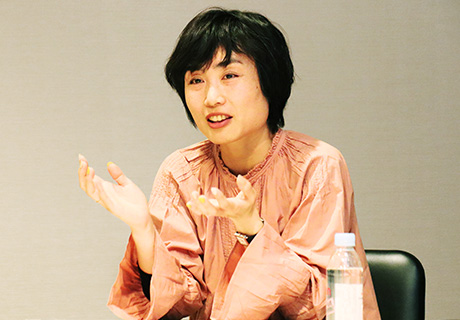
This can also be viewed as a shift from a preserve to a reserve mindset. "Preserve" implies that we are on the back foot, cautiously looking to prevent potentially hazardous events from occurring. On the other hand, "reserve" suggests preparedness. We understand that drawbacks may occur, and if they do, we are aware of the fact that other opportunities will come along. Understanding this shift is also important.
KawanaIt seems we have determined the broad direction towards which we are heading. With the Transchallenge concept, we can now begin pinpointing more specifically where and to whom we want to convey our message, and what kinds of advanced technologies we can develop to address specific problems. That is the next phase.
ItoThe most advanced technologies do not always provide solutions to societal problems. This is apparent when we speak to people with disabilities, for example. It may be that Tokyo Tech needs to seek solutions in simpler, more realistic technologies.
SatohIt is safe to say that Tokyo Tech has been very technology-driven until recently. However, it is time to place more importance on the social perspective. We want to create technologies while listening to the voices of the people, incorporating their needs, and allowing the public to understand the technologies themselves during the process. That said, the result may be nothing but a new broom to sweep our floors!
OhtakeBut the broom, like many other inventions and technologies of the past, is indispensable and must not be forgotten! Just like gears, or the screw. What would we do without the screw? The prevailing environment at Japanese universities puts pressure on researchers to create the most high-tech vacuum cleaners, rather than simply improving the broom. Given a choice, 99 percent of universities would choose to pursue the most advanced technology. Perhaps one role for Tokyo Tech is to represent that 1 percent, to re-examine the once-beaten path. Long live the broom!
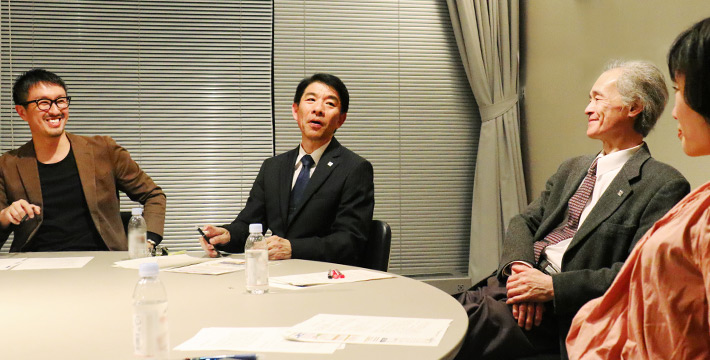
ItoYes, I agree that we must look to both the past and the future. What some Tokyo Tech researchers are seeking may well lie in the Institute's strong roots in ceramics, for example. Reinvention and rediscovery are arguably as important as the discovery of stand-alone inventions. Art has always embraced rediscovery, and today's works are not all that different from ancient cave paintings. Humans are creative beings, but if we look at paintings, sculptures, and music, for example, we can see that reinventions can have as much impact as purely new inventions or discoveries.
KawanaEven if we have a very promising technology, it will not gain public acceptance if there is an imbalance in existing interests. On the other hand, it is not uncommon for us to adopt outdated, unfamiliar technologies that scantily, if at all, contribute to the solution. Such is the nature of society and political systems, and I'm afraid if we don't understand that, our efforts will be in vain.
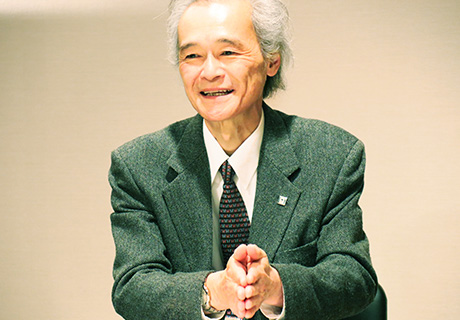
SatohThe development of various technologies is certainly positive, but whether they become actual solutions is a societal question. The engineer may present an idea as a solution, but lengthy discussion and information sharing is often required before that idea is socially accepted. Unless a channel for such discussion is available, scientists and engineers cannot create real impact. Tokyo Tech views DLab as one such kind of channel.
OhtakeIn relation to this, it is positive for human beings to experience change, unless it is change imposed by science and technology. During the DLab sessions and the creation of our future scenarios, we agreed that this was an important position to take, particularly at a time when technological advancements may attempt to persuade us otherwise.
KawanaThat's right. It also appears that many Tokyo Tech students have an a priori view of technology being fundamentally good. That is why it is also our job as educators to confront them with exactly the opposite perspective. However, while a voluntary change may be good, it also appears that modern society is often very pessimistic about change. One problem may be that people simply don't know how to achieve change.
ItoSurprisingly many students seem to think that change automatically means deterioration. They want to maintain the status quo as much as possible. That is why the impact of the environment we provide is critical. Tokyo Tech has the potential to showcase the newest technology before it is implemented. Campus-goers could time-travel 30 or 50 years into the future and sense the positive change that is already on its way. That would be a wonderful way for the Institute to demonstrate that change is good, and that while we don't know exactly how things will play out, we will take on the challenge anyway.
Tokyo Tech Future Chronology
SatohWe believe the Tokyo Tech Future Chronology represents the various desired futures that we have heard from members of the public thus far. We also hope that, while so-called future chronologies executed by businesses are often static, the Tokyo Tech Future Chronology is not. Rather, we want a constantly moving, living entity that shifts based on developments in science and technology, and generates and builds on research that aims for a better future. Tokyo Tech is home to outstanding creators of science and technology, but we also hope that the chronology evolves dynamically with the participation of other science and technology experts.
OhtakeYes, the creation of the Tokyo Tech Future Chronology with such a wide range of people has already created great results. While being a laborious effort, the project's collaborative factor is precisely what has given it so much value. I believe we are at a watershed moment now. Can we continue earnestly towards the realization of these ideas, towards important research that is supported fully by members of the Institute and the surrounding community?
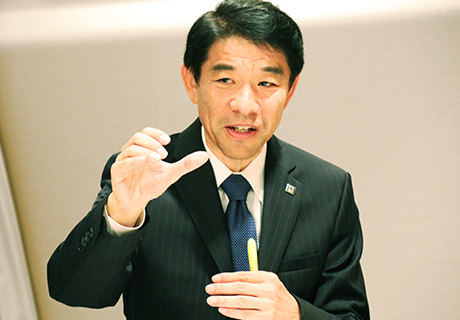
I think we can, provided that we can convince our young talents to approach their research from a "for the future" starting point. Of course, we need enthusiastic researchers tackling fundamental research too. However, it would be a magnificent achievement if we could formulate teams of emerging researchers who base their studies on public needs and the paths backcasted at DLab. The results could then be injected back into Tokyo Tech's campuses.
KawanaThe Tokyo Tech Future Chronology instils in all of us a stronger sense of responsibility. The freedom of expression in these scenarios makes us stop and think whether we really want some of these things to materialize. If there is no stimulus or polemic, most people will not stop. I think we have reached this point because of Tokyo Tech's commitment to change, and the Tokyo Tech Future Chronology will dynamically continue to give birth to new ideas as we move forward.
DLab — What's next?
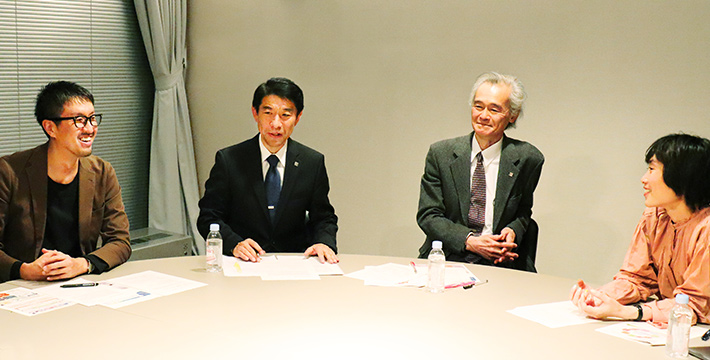
KawanaI hope we can encourage those around us to join and make DLab an Institute-wide movement. I believe the success of such a movement will be determined by how well we can attract the interest and curiosity of the science and engineering researchers for which Tokyo Tech is known.
OhtakeI agree, and that is why communication plays an important role. I hope that, in the next two years or so, we can lay the groundwork for emerging researchers to start creating research topics based on backcasted paths that reflect the desires of the public.
SatohRegardless of the levels of commitment affirmed by researchers both inside and outside the Institute, one future challenge will be to ensure the genuine inclusivity of all participants. We need to create a system that strongly supports the integration of Tokyo Tech research activities with the broader perspective of DLab.
ItoWe may already be able to identify the technologies that will help us realize a better future, but we must take that a step further and map out how such technologies function in a universally beneficial ecosystem. If we do not push the design in that direction, getting broader society on board will prove difficult.
KawanaYes, we must continue to mold DLab into an inclusive environment where the public, media, government, investors, and other stakeholders all want to share ideas. We may find, as we have already done to some extent, that we all have more in common than we expected.
SatohAs we move into the future, DLab could function as an accessible, transparent platform where researchers and policymakers engage in open discussions. To facilitate this, the Institute needs to demonstrate its willingness and ability to contribute to Japanese national policies, and to guide the whole nation in the right direction.
* Transchallenge, or transcending limits, embracing challenges
In a "transchallenge" world, limits traditionally associated with geography, physical ability, and other factors do not exist. Irrespective of who or where you are, science and technology offers everyone the opportunity to take on any challenge confidently. Innovations in virtual and augmented reality make co-experiences involving any or all of the five senses a natural part of life. Climbing the world's highest peaks at any age, empathizing with the emotions of other humans, animals, and plants, and other limitless possibilities expand our minds and better prepare us for future uncertainties. Those who are held back against their will by psychological obstacles can simply uninstall any unwanted experiences or memories. Science and technology, which has always advanced humanity, has become a driving force of the future. Some may be discouraged by the potential of failure, but in a “transchallenge” world, no efforts are in vain. There are no meaningless experiences. All actions and results are acknowledged and applied by those around us to create new value and build a better, brighter future.
The Special Topics component of the Tokyo Tech Website shines a spotlight on recent developments in research and education, achievements of its community members, and special events and news from the Institute.
Past features can be viewed in the Special Topics Gallery.
. Any information published on this site will be valid in relation to Science Tokyo.












